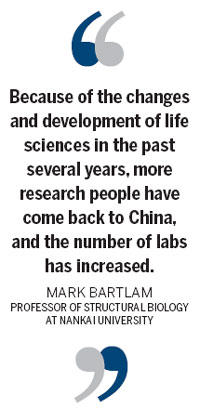Good life scientist

And so it was, when he was 18, he chose physics as his major when he went to Imperial College London, later taking a special interest in biophysics.
"When I studied biophysics, I found I could apply what I learned in physics to problems in biology, particularly problems with human health," he says. "You can develop a lot of tools and techniques to really improve human health. That was very interesting for me. So I chose to continue working on it."
After graduating from Imperial College London, he went to Oxford University to do a PhD on proteins.
Bartlam then applied to undertake post-doctorate research at Cambridge University but was unsuccessful due to funding problems.
A Chinese colleague at Oxford had returned to Beijing and set up a laboratory at Tsinghua University and was looking for researchers. He invited Bartlam to join them for a few months. He stayed for two years and became an associate professor.
After another six years at Tsinghua, Bartlam got a professorship at Nankai University and moved to Tianjin, about 110 kilometers away, where he built his own lab.
|
|
Since moving to Tianjin in 2007, work and life has undergone major changes.
The research team he led made significant progress in identifying proteins in flu viruses that can help in the development of new drugs to replace those that have become less effective in combating drug-resistant viruses, such as H5N1 avian flu and H1N1 swine flu, and other strains that are continually changing and evolving.
Based on their findings, they published two papers in Nature in 2008 and 2009.
In 2010, together with Tsinghua University and the Chinese Academy of Sciences, Nankai set up a laboratory in the Binhai New Area of Tianjin, with involvement from local hospitals.
Bartlam's research at Nankai focuses on identifying the proteins in cancer to help develop new drugs. At a certain stage, the projects are moved to a bigger lab in Binhai, where there are facilities for designing and testing potential drug treatments.
Bartlam's connections in the UK also helped him to improve communication and cooperation between scientists in China and Europe.
At Nankai University, he is setting up collaborations with leading UK institutions, including the University of Liverpool and the University of Glasgow, with student exchanges as part of the program.
There has also been an increase in conferences on life sciences.
Bartlam's personal UK-China connections have been especially strengthened. At his birthday party in 2002 at Tsinghua University, he met environmental student Wang Yingying, who was on a visit from Tianjin for two weeks.
Five years later, when Bartlam arrived at Nankai, they were re-introduced to each other and the friendship developed. They were married in September 2009, and their son Mathew was born in November the following year.
Within the next few months, Bartlam and his wife will co-publish a research paper on bacteria that feed on oil, as a possible aid to cleaning up oil pollution.
Zhang Yu contributed to this story.
yangyangs@chinadaily.com.cn
(China Daily 12/07/2012 page18)
Today's Top News
- Xi stresses improving long-term mechanisms for cyberspace governance
- Experts share ideas on advancing human rights
- Japan PM's remarks on Taiwan send severely wrong signal
- Key steps to boost RMB's intl standing highlighted
- Sustained fight against corruption urged
- Xi calls for promotion of spirit of volunteerism































